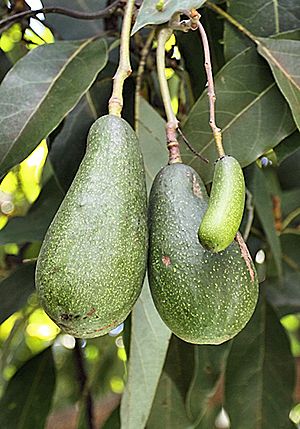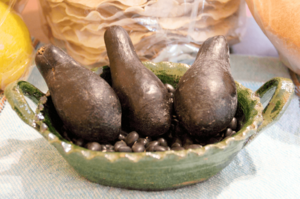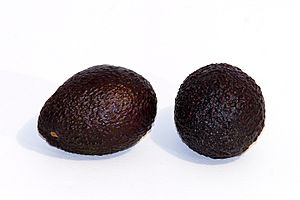Avocado production in Mexico facts for kids

Avocado farming is super important for Mexico's economy! Mexico grows more avocados than any other country, supplying almost half of all the avocados sold around the world. Other big avocado growers include the Dominican Republic, Peru, Colombia, and Indonesia.
The main avocado-growing areas in Mexico are Michoacán and the State of Mexico. Some popular types of avocados grown there are Fuerte, Hass, Bacon, Reed, Criollo, and Zutano.
Contents
Avocado History in Mexico
Avocados first grew in Central Mexico a very long time ago. Scientists found avocado seeds in a cave called Coxcatlan Cave in Tehuacán, Puebla state, that are about 10,000 years old! This shows how long avocados have been a part of life in Mexico. Even today, you can find wild avocado trees in places like Nuevo León state. Avocados then spread to other countries in the Americas, including the United States. They are a "superfood" in the Americas, and Mexico's climate is perfect for growing many different kinds.
Avocados in Ancient Cultures
Ancient people in Mexico, like the Aztecs and other native groups, believed that a fruit's shape could tell you about its special powers. Because avocados look a bit like a certain body part, they thought eating them would make you strong and healthy. Old Spanish writings from the 1500s also say that avocados helped with childbirth, swelling, and tummy aches. The Maya also loved fruit trees, including avocados, and often planted them around their homes. They believed their ancestors could be reborn as trees.
In the 1950s, farmers started growing a type of avocado called Fuerte. But about 20 years later, the Hass avocado became the most popular. This happened because a mailman in California named Rudolph Hass bought a small farm to try growing better avocado trees. He found a special type of avocado that was mostly Guatemalan but had some Mexican genes. These avocados turned a darker purple when ripe, but they tasted better, were less oily, and stayed fresh longer. Even though Rudolph Hass only made about $4800 from his patent, today, more than 85% of all avocados grown worldwide are the Hass variety!
In 2007, avocados were Mexico's fifth most important fruit crop. Most of the avocados grown in Mexico are eaten right there in the country. People in Mexico eat a lot of fresh avocados every year!
How Avocados Are Produced
Most of Mexico's avocados come from the state of Michoacán, in west-central Mexico. Michoacán grows 92% of the country's avocados and is the world leader in avocado production! About 106,000 hectares (260,000 acres) of land there is used for avocados. Farmers in Michoacán can grow about 4 metric tons per hectare (1.6 long ton/acre; 1.8 short ton/acre) of avocados, and sometimes even up to 8 metric tons per hectare (3.2 long ton/acre; 3.6 short ton/acre)! This is much more than what is grown in places like California.
Mexico is great for growing lots of avocados because it has plenty of land, workers, and good rainfall. Farmers pick the avocados by hand using long poles and baskets when the fruit is mature but still hard. In 1985, Mexico produced about 401,000 metric tons (442,000 short tons; 395,000 long tons) of avocados.
Between 2001 and 2011, Mexico's avocado production grew a lot, from 9,400,000 metric tons (10,400,000 short tons; 9,300,000 long tons) to 12,640,000 metric tons (13,930,000 short tons; 12,440,000 long tons). During the same time, Mexico's avocado exports (avocados sent to other countries) also increased a lot, from 893,000 metric tons (984,000 short tons; 879,000 long tons) to 3,470,000 metric tons (3,830,000 short tons; 3,420,000 long tons)!
In 2013, the FAO reported that Mexico had over 21,511 avocado farmers, with 10,000 of them in Michoacán. This also led to many businesses that pack and trade avocados. There are also 14 factories that turn avocados into things like guacamole, avocado pulp, frozen avocado, drinks, and oil. All these activities create over 40,000 direct jobs, about 70,000 seasonal jobs, and more than 180,000 other jobs!
The town of Tancítaro, Michoacán, calls itself "the avocado capital of the world" and even has an annual Avocado Festival!
Environmental Impact of Avocado Farming
Growing avocados can sometimes affect the environment. Avocado farms are linked to almost one-fifth of the deforestation (when forests are cut down) in Michoacán state between 2001 and 2017. A study in 2021 found that a quarter of avocado farms are in "Key Biological Areas." These are important places for protecting animals and plants that are in danger. This means that more avocado farms in Michoacán might be harming the different kinds of plants and animals in the area.
Avocado farms also use a lot of water, which can lead to water shortages. They can also cause pollution from the chemicals used to help the plants grow. These problems might continue as more and more avocados are exported.
Avocado Exports
Mexico exports a lot of avocados, but sometimes the quality can be a challenge. Between 2000 and 2011, Mexico's avocado exports grew more than four times! In 2011, exports made up about 27.45% of all the avocados Mexico produced.
For a long time, the United States limited how many fresh avocados they would import from Mexico. This was to stop tiny pests called avocado weevils from spreading. But in 1997, these limits were removed, partly because of the North American Free Trade Agreement which encouraged trade between countries.
Avocado products like avocado pulp, paste, and guacamole are very popular for export. The amount of these products exported to the U.S. is similar to the value of all fresh avocados imported. In 2016, Mexico's avocado exports to the U.S. reached $1.7 billion! This is because Americans are eating a lot more avocados – seven times more in 2016 than in 2000!
In February 2022, Mexico and the United States agreed to work together to keep agricultural inspectors safe. This happened after an inspector received a threat.
See Also



